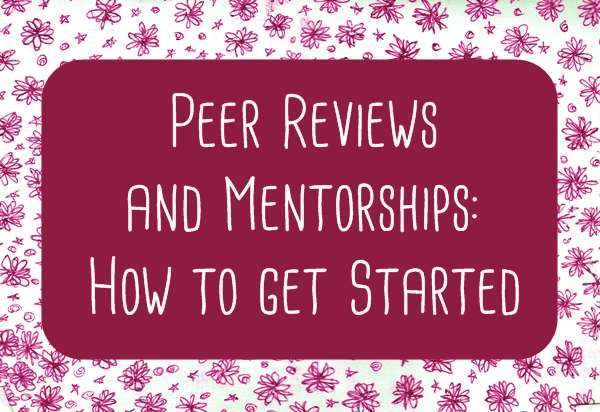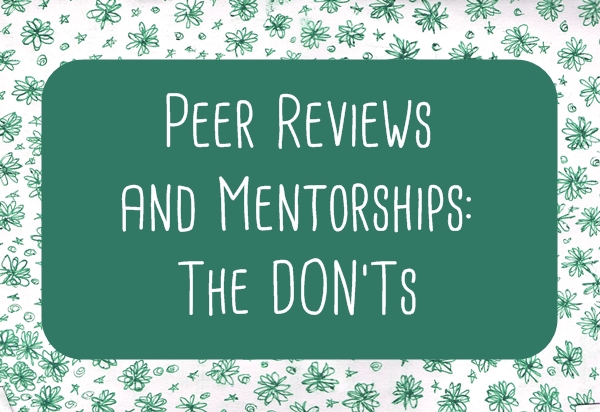Peer Reviews & Mentorships: Tips & Hints for Knitting Designers
Recently I came across a claim that peer reviews and mentorships were unknown to most knitting designers. It was said that unless you were one of the lucky ones, you had no access to peer support and you were on your own. I am here to tell you that this is wrong. I am also here to tell you how you can get your own support network started along with some tips on how to navigate the waters.

- Be open about wanting to meet other designers. If you don't say you are interested, no-one will know!
- Be kind and open-minded in all your interactions. If you come across as hot-headed or impatient, other designers may feel they cannot approach you.
- Think about what you can bring to the table (and be honest with yourself).
- Reach out to others via social media, Ravelry or emails. You are not confined to your geographical location.
- Establish the practical aspects: will you set up a message board? arrange a Google hangout? Skype? How often will you check in?
- Remember: be pro-active, generous and kind.

- DO agree upon the outcome of any peer review before you get started. "I want to know what gaps you see in my portfolio"
- DO be honest with yourself about why you want to be mentored/interact with peers.
- DO turn any negative feedback into productive action points. "I see a lot of toe-up sock patterns; I'd love to see you try different construction methods!"
- DO be generous with your feedback and skill-sharing: "In my day job, I work in a non-profit and write a lot of applications. I think your magazine submissions can be sharpened up and I'll show you how." - "Great! I do a lot of photography, and I'd be happy to teach you how adjusting shutter speed can help you."
- DO be professional. If you receive some unexpected feedback ("I see a lot of toe-up sock patterns; I'd love to see you try different construction methods!") listen carefully and with an open mind.
- DO be supportive. If someone in your peer group experiences success, be the first to cheer alongside her.
- DO ask tough questions: "Where do you see yourself in five years? What steps do you need to take to get there?"
- DO introduce others to interesting opportunities: "I saw this call for cat-themed accessories. Alison, that is totally up your street"
- DO be honest about industry experiences: "Sarah, I think it's great that Unicorn Yarns of Antarctica have approached you. LOVE their yarns! Just make sure you are happy with all the T&Cs. I had a tough time with them last year and want to make sure you know what you are doing!" or "Sarah, have fun working with Unicorn Yarns of Antarctica. LOVE their yarns, and Jessica in the Head Office is great."
- DO your research.
- DO peer reviews regularly and check in with each other.

- DON'T participate in peer reviews, support groups or mentorships thinking everybody is out to scam you or steal your ideas.
- DON'T waste people's time. Nothing is more off-putting than spending a lot of time on helping someone out and getting a "LOL, this isn't even my day job, kthxbai!" in return.
- DON'T cold-approach people at trade shows. Shows are busy, everybody is tired & stressed, and even the nicest person can be startled by a full-on approach coming out of nowhere. Start off with an email, a PM, or a tweet.
- DON'T spend all your interactions on complaining or being negative. It is fine to raise worries or complaints, but always try to be pro-active and turn negatives into positive action points.
- DON'T be intimidated. Even super-successful people are just people.
- DON'T gossip. What is said at peer group stays at peer group.
- DON'T expect magic answers. Mentors and peers can help you analyse your portfolio or help you figure out your niche. They cannot make you successful overnight.
- DON'T be a bully. If negative feedback is unavoidable, make sure your criticism is constructive and relevant.
- DON'T seek answers just from knitting designers. Read the business section, borrow books on how to juggle a portfolio career, and ask other sectors smart questions.
- DON'T give up. If you don't find the right mix of people or if you fail to find a more experienced designer willing to mentor you, just keep trying.
Comments are always welcome and discussions are encouraged x